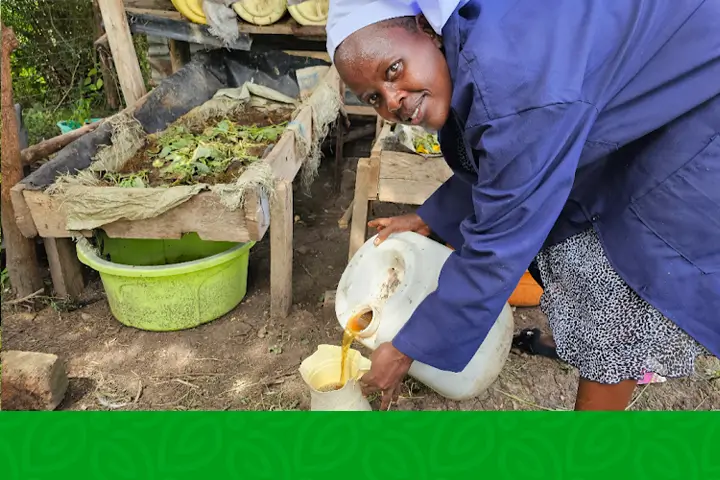
Nyanza, a region nestled in Kisumu County, Kenya, is a picturesque landscape where farming is the lifeblood of its vibrant communities. Amidst the fields of maize, sorghum, and millet, a beacon of innovation and sustainability shines brightly. Meet Evelyne Okoth, a 35-year-old woman who has transformed her farm in Agoro East village into a remarkable model of climate-resilient agriculture. Evelyne’s circular farming approach not only showcases the interconnectedness of nature but also champions the conservation of traditional foods and indigenous seeds, offering hope and inspiration to her community and beyond.
A Visionary Farming Approach: Circular Economy in Action Evelyne Okoth’s farm is unlike any other you’ll find in Nyando. From the moment you pass through the gate, you’re greeted by a tapestry of diverse crops and sustainable practices. To your right, sweet potato vines intermingle with indigenous maize varieties. Pawpaw trees bear fruit abundantly, while vertical gardens flourish with an array of vegetables. Here, vermiculture, a sustainable method using earthworms to process vermicompost and liquid fertilizer, plays a pivotal role. Evelyne describes her farming as a “circular economy” where every activity serves a purpose, creating an interconnected web of sustainability.
Synergy in Sustainability: Interdependence at Its Best Evelyne’s farm embodies synergy in sustainability. Water from her fish pond irrigates her vegetable garden, creating a harmonious cycle. Vegetable waste nourishes her poultry, while cow waste is transformed into valuable vermicompost and vermin juice, enriching the soil in her vegetable garden. Every aspect of her farming ecosystem is interdependent, demonstrating the power of nature-inspired agriculture.
Championing Indigenous Seeds: The Kabudi-Agoro Community Seed Bank Evelyne is not just a farmer; she’s a conservationist of traditional food and indigenous seeds. She co-founded the Kabudi-Agoro Community Seed Bank, a collective effort that brings together 25 women who save and exchange various indigenous seeds. Evelyne’s farm is a living testament to her dedication, where she multiplies an astonishing 67 different varieties of beans, 10 varieties of sorghum, five sweet potato varieties, two cassava varieties, and seven indigenous maize varieties. Her commitment to preserving these seeds ensures resilience against climate challenges and pests.
A Journey into Agroecology: Empowered by Knowledge Evelyne’s path to becoming an agroecological champion began in 2018 when she crossed paths with officials from The Alliance Bioversity and International Center for Tropical Agriculture (CIAT). At the time, she faced challenges in accessing seeds, especially resilient indigenous varieties. Through training in seed production, selection, saving, and seed banking, she embraced agroecology and is now reaping its rewards.
Farming for Prosperity: A Bright Future From her farm, Evelyne derives a steady income. Her vegetable garden yields approximately Ksh 250 daily, while her fish pond houses 1,000 fish, sold every eight months for Ksh 200-Ksh 250 each. Currently, she has 600 3-day-old chicks, which will be ready for sale in four months, potentially fetching up to Ksh 1,000 each. However, her primary challenge is the scarcity of water, exacerbated by changing climate patterns. Evelyne dreams of implementing an irrigation system to ensure year-round production.
A Message for the Youth: Embrace Agroecology Evelyne’s message to the youth is clear: embrace agroecology. It offers a sustainable farming pathway that requires minimal capital but yields substantial income. Unlike conventional agriculture, agroecology leverages natural resources, making it accessible to all. Evelyne empowers young women to be economically independent and contribute to healthier families through diversified diets.
A Sustainable Future Through Agroecology Agroecology isn’t just about farming; it’s about safeguarding biodiversity and mitigating climate risks. Gloria Otieno, a Genetic Resources and Food Security Policy Specialist at The Alliance, emphasizes the vital role of women in conservation. Through initiatives like Nature-Positive Initiative (Nature+), farmers like Evelyne receive training in permaculture, paving the way for sustainable agricultural systems that benefit both people and nature.
Creating Opportunities for the Youth Dr. Carlo Fadda, the Research Director for Biodiversity for Food and Agriculture at The Alliance, envisions a brighter future for the youth through initiatives like Nature+. These opportunities include compost making, value addition, marketing, and transportation. As the world grapples with pressing challenges, young people who embrace agroecology can become catalysts for positive change in their communities.
In Evelyne Okoth’s farm, we find a source of inspiration and hope, a testament to the transformative power of sustainable agriculture. Her circular farming model, commitment to preserving indigenous seeds, and advocacy for agroecology illuminate a path towards a greener, more prosperous future for Nyanza and beyond.
The orginal article was written by LOISE MACHARIA for The Star
Stay updated with the latest farming tips and agriculture industry news from Africa by subscribing to our newsletter. Don’t miss out on valuable insights and updates. Follow us on Twitter, LinkedIn, and Facebook to join our farming community and stay connected with us.



















